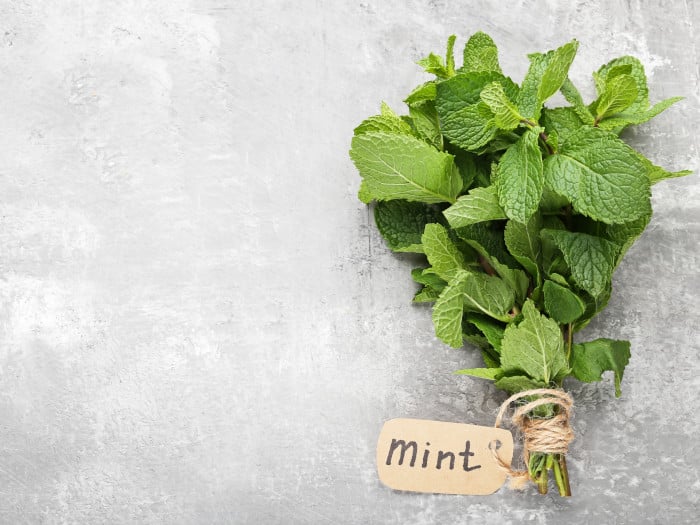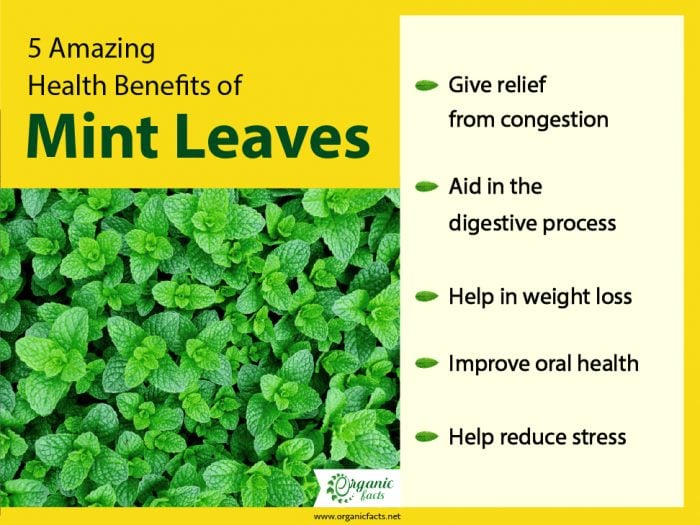Table of Contents
- What is Mint? [1]
- Health Benefits of Mint Leaves
- Might Relieve the Symptoms of Cold
- May Alleviate Allergies & Hay Fever
- Might Regulate Digestion
- May Aid in Breastfeeding
- Might Give Relief from Respiratory Disorders
- Skin Care
- Might Induce Weight Loss
- Might Boost Memory
- Oral Care
- May Relieve Nausea
- Might Alleviate Headaches
- May Relieve Stress
- Adding Mint to Your Diet [15]
- Side Effects [16]
What is Mint?
It can be used in many culinary preparations in its fresh or dried form. Many personal care products contain mint as an ingredient. Things such as toothpaste, shaving gels, chewing gums, breath fresheners, candies, teas, balms, oils, and inhalers with a mint flavor are the most used. [18]
Due to its fresh taste, the mint extract is often paired with cakes, cookies, nutrition supplements, sugar-free products, and energy bars. Mint oil is used in ice-creams and chocolates. Mint syrup is used in alcoholic and non-alcoholic beverages.
Apart from these different types of mint are used to prepare various oils such as peppermint oil and spearmint essential oil that provide many uses and benefits.
Health Benefits of Mint Leaves
Most of us are familiar with the refreshing application of mint, but it has far more to offer than that. The health benefits include the following:
Might Relieve the Symptoms of Cold
Mint is often assumed to be a good relaxant and might it help relieve congestion. But multiple clinical trials show that menthol has no effect on decongestion. That being said, menthol might help reduce nasal obstruction. This means that it may help you with cold and flu symptoms. [19] [20]

A fresh and aromatic bunch of mint leaves Photo Credit: Shutterstock
May Alleviate Allergies & Hay Fever
Seasonal allergies and hay fever (also known as rhinitis) affect millions of people around the world. Extracts of mint leaves have been shown to possibly inhibit the release of certain chemicals, which aggravate severe nasal symptoms associated with hay fever and seasonal allergies. [21]
Might Regulate Digestion
Mint is a great appetizer or a palate cleanser. The aroma of the herb may help in activating the salivary glands in your mouth as well as the glands which secrete the digestive enzymes, thereby facilitating digestion. It may also soothe the stomach in case of indigestion or inflammation.
It can be a potent remedy for relieving the symptoms of irritable bowel syndrome (IBS). A 2013 study showed that menthol in mint could relieve diarrhea. [22]
May Aid in Breastfeeding
A research study published in the International Breastfeeding Journal in 2007 has shown that mint oil may help reduce the nipple cracks and pain that often accompany breastfeeding. [23]
Might Give Relief from Respiratory Disorders
Research led by Prof. Ron Eccles at the University of Wales, UK, states that menthol, present in mint, may help in relieving nasal congestion. It might also be very effective in clearing up congestion of the throat, bronchi, and lungs, which might give relief from respiratory disorders that often result from asthma and common colds. [24]
As it might cool and soothe the throat, nose, and other respiratory channels, it may also relieve the irritation which causes chronic coughing. This is the main reason why so many balms are based on mint. Unlike the inhalers that are based on aerosols, those with mint as the fundamental component tend to be more effective and eco-friendly as well.
Skin Care
While mint oil can be a good antiseptic and antipruritic material, the juice obtained from the leaves may be an excellent skin cleanser. It may soothe the skin and help reduce infections and itchiness. In addition to being a good way to reduce pimples, it can even relieve some of the symptoms of acne.
It may have antipruritic properties that can be used for treating bugs and insect bites like those of mosquitoes, honey bees, hornets, wasps, and gnats. [25]
The cooling sensation may relieve you from irritation and the constant urge to scratch, and the anti-inflammatory nature might bring down the swelling. Its oil is often a basic component of bug repellents like citronella candles because the strong aroma is unappealing to most insects.
Might Induce Weight Loss
Mint leaves may help in your efforts to lose weight healthily. A study published in 2003 suggests that it might help in stimulating the digestive enzymes that absorb nutrients from food and consume fat and turn it into usable energy. If you switch from drinking soda or sweetened beverages to drinking sugar-free mint tea, it may help you lose weight due to reduced calorie intake. A 12 oz mint tea that has no added sugar has zero calories while a 12 oz soda has 150 calories. [26]
You can add mint to this amazing juice cleanse diet.
Might Boost Memory
A study was conducted by Dr. A. P. Allen and Dr. A. P. Smith from Cardiff University, on the effect of chewing gum on stress, alertness, and cognition. It found that people who frequently used chewing gum, in which the major active ingredient is mint, had higher levels of memory retention and mental alertness than those who did not. [27]
The stimulant qualities of this herb show that popping that stick of gum or chewing on raw mint leaves may help improve cognition.
Oral Care
According to research, mint may have germicidal qualities and can quickly freshen breath. It can also add to oral health by inhibiting harmful bacterial growth inside the mouth and by cleaning the tongue and teeth. This is why the herb would often be rubbed directly on the teeth and gums to refresh the mouth and maybe eliminate dangerous forms of growth. [28]
In modern times, for the same reason, menthol is one of the most common elements in toothpaste, mouthwashes, and other dental hygiene products. Of course, the easiest way to get these results is to simply chew on the leaves.

Due to its fresh taste, the mint extract is often paired with cakes, cookies, nutrition supplements, sugar-free products, and energy bars.
May Relieve Nausea
Mint leaves, especially freshly crushed ones, may help you deal with nausea and headache. The strong and refreshing aroma can be a quick and effective remedy for nausea. Use mint oil or any other product having a mint flavor and your stomach issues may be alleviated. Many people keep menthol oil or mint-flavored products on hand to avoid nausea. [29]
Might Alleviate Headaches
An issue released by the Swiss Institute of Bioinformatics mentions that using mint may help in relieving headaches. Balms with a mint base or basic mint oil, when rubbed on the forehead and nose, can give quick relief in case of a headache. This herb is a naturally soothing substance, so it might alleviate inflammation that is often associated with headaches and migraines. [30]
May Relieve Stress
Mint can be a natural stimulant and the smell alone can be enough to uplift your mood. A research done in 2014 states that including it in your diet can be a great option if you are feeling sluggish, anxious, depressed, or simply exhausted, the herbal leaves and their essential oil can help. [31]
It can be ingested, applied topically in a salve form, or inhaled as a vapor, and all of these techniques can give you a much-needed boost. A popular way to get good results in an easy manner is to put a few drops of mint essential oil or menthol oil on your pillow at night and let it work on your body and mind while you sleep.
You can even experiment by using a eucalyptus mint body wash as it is known to cool and invigorate the body.
Other Benefits
Aside from the benefits mentioned above, mint is also helpful in the following ways.
- Drinks and foods containing this herb may provide a refreshing burst in summer.
- One peculiar property of mint that seems quite contrary to its traditional cooling and soothing effects is that it might induce sweating if consumed during fever, thereby breaking the fever and speeding the rate of recovery.
- Mint juice can also be applied to heal and soothe burns.
- It may also be beneficial in the treatment of rheumatism.
Adding Mint to Your Diet
Mint leaves make for a perfect garnish when you are preparing cocktails, rice dishes, pot rice, and salads. You can add fresh leaves to your smoothies, juices, and drinking water as well. Here are a few recipes you can try with mint:
- Orange Lemonade With Mint & Ginger Recipe
- Mint Flavored Quinoa Recipe
- Summer Cocktails Which Are Good For Health
- Delicious Créme de Menthe Drink
Side Effects
Mint, like many other herbs, has a couple of risks.
A study published in the Journal of Thoracic Disease suggests that mint may aggravate gastroesophageal reflux disease (GERD) symptoms. Research also shows that using extracts of spearmint, which is a type of mint, in excess may affect male fertility. Menthol is considered strong and toxic if taken in a high amount, so do consult with your doctor before you include it in your regular diet. [32] [33]
If you are looking to use essential oils derived from mint, we suggest you consult with a medical expert.
